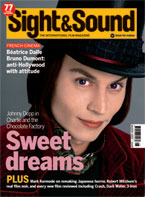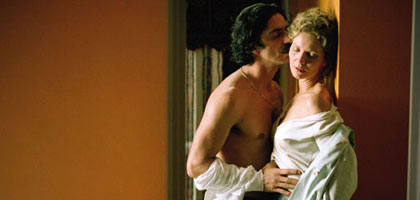
Yes
USA/UK 2004

Reviewed by Leslie Felperin
Synopsis
Our synopses give away the plot in full, including surprise twists.
London, the present. A Belfast-born woman scientist who grew up in the US, named only 'She' (Joan Allen), is married to Anthony (Sam Neill), an English politician who cheats on Her. The two of them hardly speak to one another. Her cleaner (Shirley Henderson) describes to camera secrets she discovers about them in the course of her work. One night, at a function where She rows with Anthony, She meets the similarly unnamed 'He,' (Simon Abkarian) a Lebanese chef who was once a surgeon in His native land. He flirts with Her. The two make a date to meet, and end up in bed one afternoon.
The affair becomes more passionate, but the lovers find the cultural differences between them, as well as the infidelity, a strain. At His work, racist comments from a colleague, Whizzer (Raymond Waring), lead to a fight and He leaves his job. Anthony makes a half-hearted pass at Her teenage god-daughter Grace, which enrages Her and precipitates a final breakdown of their marriage. At the same time, He feels drawn back to his roots and estranged from Her western world view. He returns to Beirut.
Meanwhile, She is summoned to Belfast to the deathbed of Her aunt (Sheila Hancock), a staunch communist in her youth, who raised Her as a child. With her dying words, the aunt enjoins Her to visit Cuba and She decides to go. Over the phone, She offers Him an open ticket to join Her, but He refuses, having already flown to Beirut. She travels to Cuba, and discovers a new way of life there. He reconnects with His old one in Beirut. However, one day He arrives at Her building in Cuba, and although it is unclear what the future holds, the reunion is a tender one.
Review
Films written in verse are precious few in number, a slim volume made up mostly of adaptations of Shakespeare and other Renaissance-to-Restoration playwrights, Cyrano de Bergerac and bits of My Own Private Idaho. So, if nothing else, director Sally Potter is to be applauded for her audacity for making Yes, a film written entirely in iambic pentameter, with a present-day setting. Risking accusations of pretentiousness as hardly any British films (invariably cautiously naturalistic, however visually stylised) do, the film's versifying gambit works surprisingly well, finding its occasionally clumsy but mostly dainty feet in a compact space.
However, getting the balance between such formal brio, deep-dish themes and a simple emotional accessibility is a tall order. The decision to write Yes in verse, according to Potter, arose from a need to find a way to create "a flow to things that naturalises... [the film's] big ideas," which concern, among other things, the impact of global politics and microscopic biology on intimate human relations.
A potentially hackneyed story of a cross-cultural love affair between an Irish-American scientist (Joan Allen) and a Lebanese doctor-cum-chef (Simon Abkarian) thus becomes a tightly choreographed minuet of ideologies, ideas and imagery, in the shadow of an unmentioned 9/11. This necessitates a lot of nifty footwork as the characters' dialogue and internal monologues range across the structure of cells, the nature of dirt, the feel of skin and the scars of war, the shifting of gears mostly smoothed over by the clutch of rhyme and rhythm. All the same, the occasional awkward construction stalls the ear, for instance when the main female character, known only as She, tries to reassure her goddaughter about her weight with, "I did not infer that you were overlarge," a truly atrocious line, semi-iambic or not.
Similarly, the would-be semi-realist male banter in the chef's kitchen, peppered with plenty of swear words, feels more contrived than the lovers' harmonising couplets. When it comes to rendering how men in that environment spar with each other, however much experience Potter has had as a lyricist, musician and film-maker, the evidence here suggests she has spent less time hanging out in restaurant kitchens than she has reading Tony Harrison's saltier verse.
But when Yes is in full flow, its force approaches the torrential. Much credit for this is due to the excellent lead performances by Allen and Abkarian, adeptly massaging the lines to put across meaning more than measure, and Alexei Rodionov's elegantly contrapuntal digital cinematography, which occasionally tinkers with camera speed to create correspondingly poetic visual moments, enhanced by simply edited fades and slow jump cuts. Despite her occasional faults as a director (self-indulgence, humourlessness), feminist film-making icon Potter has always shown rare taste in casting and DoPs, from her breakout Orlando through to the flawed if ambitious last The Man Who Cried, and her key collaborators here smooth over the script's sometimes too-schematic shape-shifting.
Thanks to the onscreen chemistry between the leads, Yes convinces best as a study of passion, sparingly shot, that conjures the lovers' rapture best in wordless moments, such as Him dancing on a table draped in a sheet, or Her glowing with erotic reverie as she peers into a microscope. Allen's fine-boned, parchment-white face is a sufficiently calibrated instrument in itself to bring the verse alive, never more so than when she mutely cries at the bedside of her dying aunt, whose soliloquy spoken with an Irish twang by Sheila Hancock conjures Beckett more than Joyce even though the last word of the latter's Ulysses is said by Potter to have partly inspired the title of her film. Yes ultimately affirms the talent of all involved.
Credits
- Director
- Sally Potter
- With
- Joan Allen
- Simon Abkarian
- Sam Neill
- Shirley Henderson
- Certificate 15
- 100m 10s
